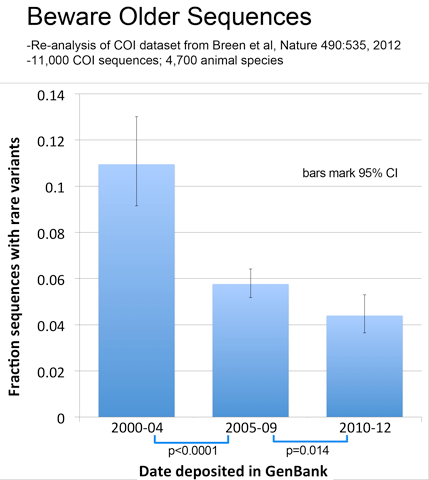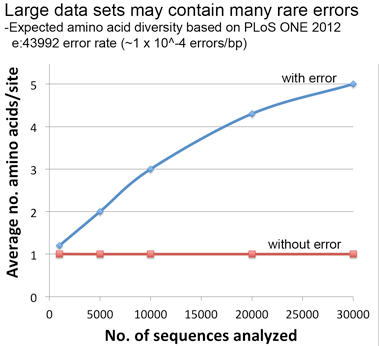The entire issue of Population and Development Review with our article about Peak Farmland is now online: Population and Public Policy: Essays in Honor of Paul Demeny https://www.popcouncil.org/publications/books/2012_PDRSuppPopPublicPolicy.asp and will be published on Wiley’s Population and Development Review site shortly.
Blog
Kiefer BioFuels Report
Biofuels attract lots of money and political support in the USA, but they have lots of environmental and economic shortcomings. Captain Todd A. “Ike†Kiefer has written a comprehensive, penetrating critique, “Twenty-First Century Snake Oil: Why the United States Should Reject Biofuels as Part of a Rational National Security Energy Strategy.†Jesse Ausubel and Paul Waggoner mentored Captain Kiefer on aspects of his study.
ABC story on food fraud cites Rockefeller DNA barcode team
The food watch segment of ABC national tv news reporting on widespread inaccurate labeling (“Food Fraud? Watchdog Group Raises Concerns – Non-profit group tracks reports of fake ingredients in products from olive oil to juice) recognizes the contribution of the student team of Catherine Gamble, Rohan Kirpekar, and Grace Young working with Mark Stoeckle in an excellent video segment (RU segment begins 3 minutes 50 seconds into the report). For full information about DNA barcoding projects carried out by the students, see https://phe.rockefeller.edu/barcode/
Phylogenetically diverse COI dataset extends evidence that rare variants are often errors
In October 2012 Nature 490:535, Breen and colleagues reported on amino acid variation among 13 mitochondrial protein and 2 nuclear proteins based on alignments of 3,000-53,000 sequences representing 1,000 to 14,000 species. They found that on average, a given site in a protein accomodates 9 different amino acids. Based on the distribution of variants, they conclude that epistasis (interaction among genes) strongly constrains molecular evolution.
Here Kevin Kerr and I re-analyze their large COI dataset [19,000 sequences (8,300 human); 4,700 species], generously provided by senior author Fyodor Kondrashov. Our aim is to determine if the frequency matrix approach we applied to avian BARCODEs (PLoS ONE 2012 e:43992) can be used to identify errors in a more phylogenetically diverse dataset. As the authors note, sequencing error is a potential confounder for their analysis; they used a different approach to assess error than we present here.
Brief methods. COI nucleotide alignment opened in MEGA, translated using appropriate table (~95% of COI dataset is insects or vertebrates), and exported to Excel; frequencies calculated at each amino acid position, and amino acid letter sequences converted into amino acid frequencies. For this analysis we defined rare variants as amino acids present in fewer than 0.02% (1/5000) sequences. In this dataset, rare variants comprised about half (46%) of the total amino acid diversity. For analyses illustrated below, we excluded the 8,281 human sequences, which had very few (8) rare variants.
Results
As observed with avian BARCODEs, rare variants in this dataset were less common in newer sequences, consistent with improved sequence quality over time.
Rare variants were associated with low quality sequences–those with internal N’s, generating unknown “X” amino acids.
Lastly, a thought experiment applying the error rate from our PLoS ONE paper suggests that significant artifactual amino acid diversity is expected when error rate x dataset size is equal to or greater than 1, conditions that may be met by large datasets particularly those containing older sequences as in this COI alignment.
These results reinforce our published observation that a frequency matrix approach is a useful and important tool for analyzing error among large datasets. We hope that others will utilize this approach.
Regarding the findings of Breen and colleagues, our re-analysis suggests that error makes a greater contribution to amino acid diversity in this dataset than that calculated by authors, although the main conclusion of their paper regarding epistasis would likely be unchanged.
Ocean Champion symposium video posted
The video of the 2-hour 26 October 2012 Symposium on Wealth of the Oceans at Monmouth University has been posted, as well as the 13-minute luncheon award ceremony when Jesse was named National Ocean Champion.
We have also posted the 24-page color booklet from the event: Ausubel, Jesse H. 2013. “Wealth from the Oceans: Use, Stewardship, and Security.†Keynote address, 8th Annual Future of the Ocean Symposium, Monmouth University, West Long Branch, N.J., 26 October 2012. This is a 4MB version; if you would like the 27MB version with higher resolution images, please contact us.
RealClear on Peak Farmland
RealClearEnergy’s William Tucker has posted an article about our paper on Peak Farmland.
Matt Ridley on Peak Farmland
Peak Farmland stimulates a vivid column in the Wall Street Journal by Matt Ridley on Saturday 21 December.
- MIND & MATTER
- December 21, 2012, 8:39 p.m. ET
Our Fading Footprint for Farming Food
Matt Ridley
It’s a brave scientist who dares to announce the turning point of a trend, the top of a graph. A paper published this week does just that, persuasively arguing that a centurieslong trend is about to reverse: the use of land for farming. The authors write: “We are confident that we stand on the peak of cropland use, gazing at a wide expanse of land that will be spared for Nature.”
If not for biofuels, say scientists, farmland usage would already be declining.
Jesse Ausubel and Iddo Wernick of Rockefeller University, and Paul Waggoner of the Connecticut Agricultural Experiment Station, have reached this conclusion by documenting the gradual “dematerialization” of agriculture. Globally, the production of a given quantity of crop requires 65% less land than it did in 1961, thanks to fertilizers, tractors, pesticides, better varieties and other factors. Even corrected for different kinds of crops, the acreage required is falling at 2% a year.
In the U.S., the total corn yield and the total corn acreage tracked each other in lock step between 1870 and 1940—there was no change in average yield per acre. But between 1940 and 2010, corn production almost quintupled, while the acreage devoted to growing corn fell slightly. Similar divergences appeared later in other countries. Indian wheat production increased fivefold after 1970, while wheat acreage crept up by less than 1.5 times. Chinese corn production rose sevenfold over the same period while corn acreage merely doubled.
Yet the amount of farmland in the world was still rising until recently. The reason is that increased farm productivity has been matched by rising demand for food, driven by population growth and swelling affluence. But the effects of these trends are waning.
Global population growth has slowed markedly in recent years—the rate of change halving since 1970 to about 1% a year today. Growing affluence leads people to eat more calories, and especially more meat. Since it takes two to 10 calories of maize or wheat to produce a calorie of meat, depending on the animal, carnivory demands more cropland. But as a country gets richer, total calorie intake soon levels off, even as wealth continues to rise, and the change in meat consumption decelerates. Chinese meat consumption is now rising less than half as fast as Chinese affluence; Indians have grown richer without taking to meat much at all.
What the Rockefeller team did was plug some highly conservative assumptions about the future into a model and see how much land would be required for growing crops in 2060. Compared with current trends, they assumed population growth will fall more slowly, that affluence will increase faster and that the gluttony of people will rise more rapidly. Conversely, they assumed that farm yields would rise more slowly than they have been doing. This seems highly implausible given that the gigantic continent of Africa seems to be at last embarking on a yield-boosting green revolution as far-reaching as Asia’s was.
Even with these cautious assumptions, the researchers find that over the next 50 years people are likely to release from farming a land area “1½ times the size of Egypt, 2½ times the size of France, or 10 Iowas, and possibly multiples of this amount.”
Indeed, the authors find that this retreat from the land would have already begun but for one factor so lunatic that they cannot imagine it will not be reversed soon: biofuels. If the world had not decided to subsidize the growing of energy crops on 3.4% of arable land, then absolute declines in the acreage of arable land “would have begun during the last decade.” The prospect of “the restoration of vast acreages of Nature” is enticing for nature lovers.
Predictions of peak oil have repeatedly proved wrong. But the factors that made them wrong—productivity and technology—are essentially the ones that make a prediction of peak farmland likely to be right.
A version of this article appeared December 22, 2012, on page C4 in the U.S. edition of The Wall Street Journal, with the headline: Our Fading Footprint for Farming Food.
Google Impact supports DNA Barcoding
Border inspectors and wildlife officials around the world look for endangered species killed and trafficked in violation of national laws and international treaties. Sometimes the objects are easily identified but many cannot be identified, even by expert taxonomists. ‘Bushmeat’ is often trafficked as dried smoked meat removed from bones with diagnostic features. Endangered plants might be exported as seeds or leaf cuttings, or as medicinal powders. Articles of clothing and jewelry may have been tanned or dyed, making sure identification difficult.
In early December Google announced a new Global Impact Awards <https://www.google.com/giving/impact-awards.html> program to support organizations using technology and innovative approaches to solve some of the world’s toughest challenges. A project at the Smithsonian Institution<https://www.google.com/giving/impact-awards.html#consortium> devoted to reducing illegal wildlife trafficking is among the first seven grant recipients. A $3 million Global Impact Award will go to the Consortium for the Barcode of Life <https://www.barcodeoflife.org/content/about/what-cbol> (CBOL) to create a ‘DNA barcode’ reference library for approximately 2,000 endangered species and 8,000 species that are closely related to them or are commonly confused with them.  We are proud to have helped create CBOL in 2004 with the support of the Alfred P. Sloan Foundation and to have fostered this new phase of CBOL activity.
National Cockroach Project
The DNAHouse project alerted us to the value of barcoding a New York City cockroach…and now Mark Stoeckle announces the initiation of the National Cockroach Project.
Jeanne Garbarino posts a blog item about Do It Yourself (DIY) science that features the project in Nature / Spot On.
IQOE on the radio
The International Quiet Ocean Experiment is the subject of a good segment on National Public Radio’s All Things Considered news program prepared by Sasha Pfeiffer and Lynn Jolicoeur at WBUR Boston. The segment feature Jesse Ausubel and an excellent sample of sounds of the sea.


